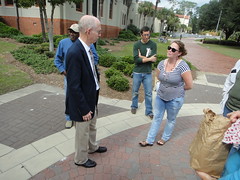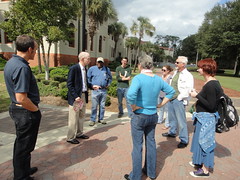Received yesterday on Allocate resources in a yearly budget? -jsq
As I was out campaigning, it was interesting what people are
interested in having their pennies spent on. Many want better sidewalks and safer places to ride their bikes. One Valdosta police officer particularly commented on the dangerous bike riding conditions (especially on North Oak Extension). Many in the un-incorporated areas want increased fire protection and it seems that everyone better drainage (and I don't mean simply open ditches for rain water) and still others would like to see some soccer fields.
It seems like we should be able to do some prioritizations and then save up for these things. I guess that will be up to the new commission chairman and members and they will have to figure out how to move forward without a SPLOST immediately in 2014.
Personally, I'd like to see a public accounting of how the previous SPLOSTS were spent. And not in big categories, but the actual details… But that's just me.
-Gretchen Quarterman
-jsq









